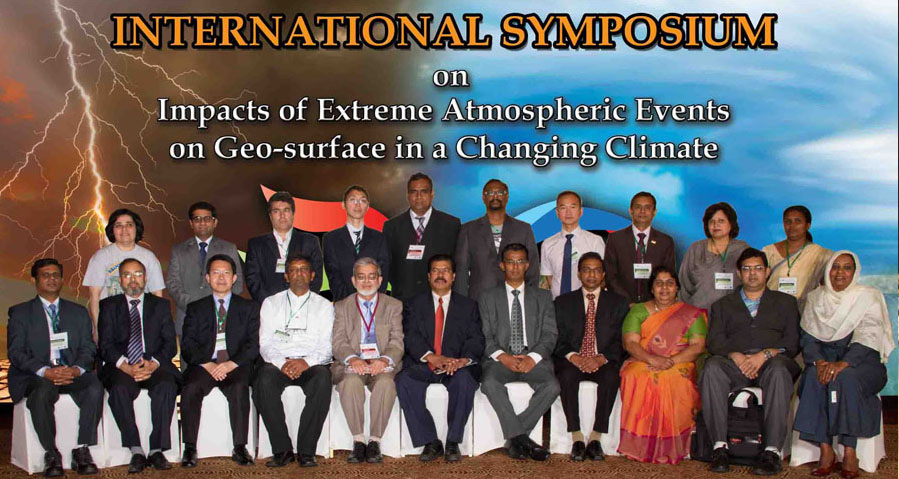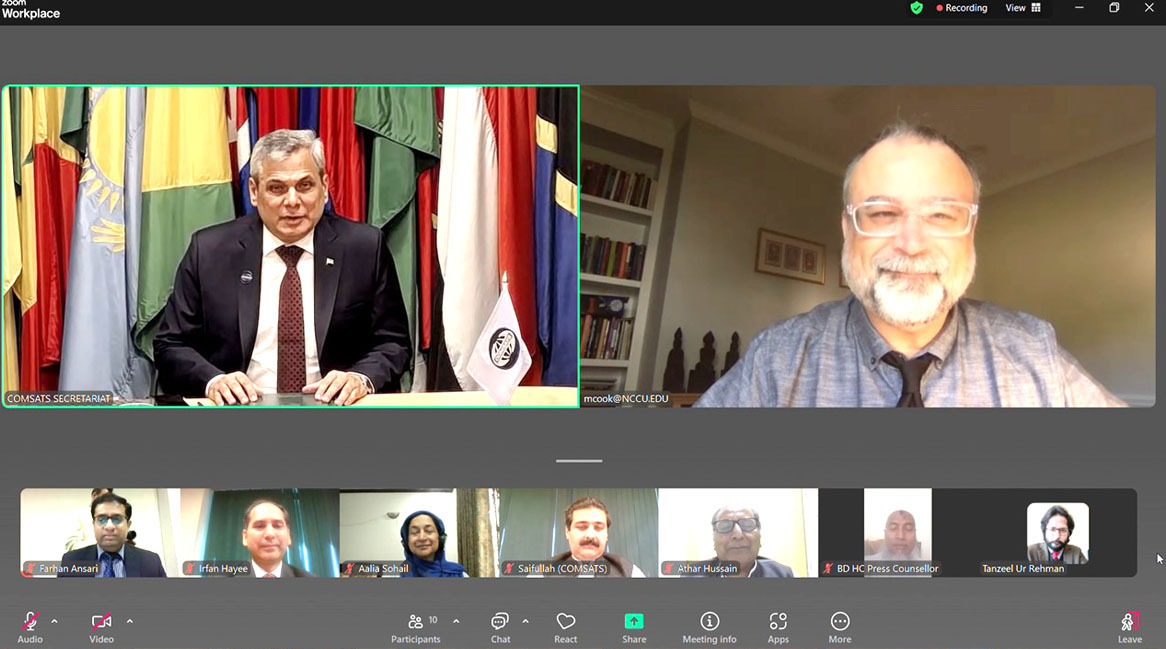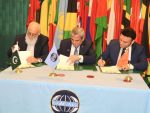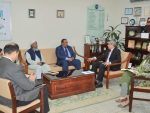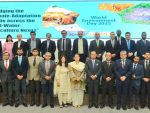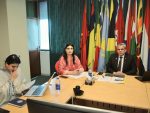The two-day International Symposium on ‘Impacts of Extreme Atmospheric Events on Geo-Surface in a Changing Climate’ was successfully held on 14-15 May 2015, in Colombo, Sri Lanka. The event was jointly organized by COMSATS and two of its Centres of Excellence, the Industrial Technology Institute (ITI), Sri Lanka, and the International Center for Climate and Environment Sciences (ICCES), China.
The key objective of the event was to provide a forum for the exchange of knowledge on natural disasters and mechanisms of extreme atmospheric events; sharing of skills and know-how for prediction of such events and preparedness for future environmental calamities; and encouraging the participants to initiate collaborative research projects related to the prediction of extreme atmospheric events.
The symposium was inaugurated on 14th May 2015, by the Secretary, Ministry of Higher Education & Research, Government of Sri Lanka, Mr. P. Ranepura. Speaking at the occasion, Mr. Ranepura stated that the developing countries are being hugely affected by the extreme atmospheric events, in the form of droughts, floods, cyclones, etc., and therefore considered the symposium in-line with the current needs and priorities of the countries of the South. He hoped that the event will be successful in facilitating collaboration among the participating scientists for studying the impacts of atmospheric extreme events as well as working out related mitigation strategies.
Earlier, Mr. Niroshana Perera, Chairman ITI, stated that studying the extreme atmospheric events and their impacts on different regions of the world is a collective responsibility, and his country is ready to play an active role in this regard. He thanked COMSATS for providing an opportunity to ITI to host this long-awaited international event in Sri Lanka.
Dr. Imtinan Elahi Qureshi, Executive Director COMSATS, in his address at the occasion, overviewed the legal and political developments at the international level, since the global realization of the significance of climate change leading to United Nations Framework Convention on Climate Change (UNFCCC) in Rio conference of 1992. Explaining the huge risks faced by mankind, particularly developing countries, due to extreme events associated to climate change and global warming as per the findings of Intergovernmental Panel on Climate Change, the Executive Director informed that COMSATS is dedicated to promote international cooperation among the countries of the South for collectively addressing their common challenges. In this regard, he mentioned the capacity building activities executed by COMSATS in this field, as well as the research activities of COMSATS’ International Thematic Research Group on ‘Climate Change and Environmental Protection’, which was to hold its fourth meeting in conjunction with the symposium.
Prof. Zhaohui Lin, Director ICCES, China, stated that there is sufficient evidence to beli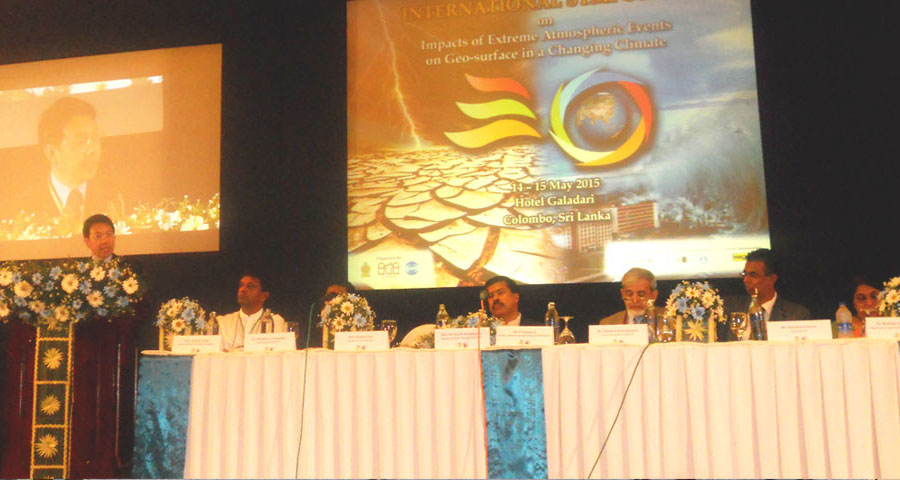 eve that changes are taking place in the climatic extremes in different regions of the world. He informed that most developing countries, including China, are aware of the need to promote research activities and collaborations in this field with a view to understand the mechanisms and impacts of extreme atmospheric events. He congratulated and thanked ITI for hosting this important event, and playing its part in the overall efforts to limit climate change.
eve that changes are taking place in the climatic extremes in different regions of the world. He informed that most developing countries, including China, are aware of the need to promote research activities and collaborations in this field with a view to understand the mechanisms and impacts of extreme atmospheric events. He congratulated and thanked ITI for hosting this important event, and playing its part in the overall efforts to limit climate change.
During the inaugural session, a Memorandum of Understanding (MoU) between ITI and ICCES, for the establishment of the Climate Change Research Centre was also signed by Dr. Muditha Liyanagedara, Acting Director General ITI, and Prof. Zhaohui Lin, Director ICCES, China. The signing of MoU was followed by a keynote address by Prof. Ajith de Alwis, Senior Professor, Department of Chemical and Process Engineering, University of Moratuwa, Sri Lanka.
The countries represented during the symposium included Malaysia, Pakistan, Bangladesh, Iran, Thailand, China, and Sri Lanka. The event featured thirteen invited lectures by the following foreign and local resource persons: Prof. Zhaohui Lin, Director ICCES, China; Dr. Gorakanage Arosha Chandima Gomes, Associate Professor (Electrical Engineering), Department of Electrical & Electronics Engineering, Universiti Putra Malaysia, Malaysia; Dr. Shahina Tariq, Chairperson, Department of Meteorology, COMSATS Institute of Information Technology (CIIT), Pakistan; Prof. Dr. G. M. Tarekul Islam, Institute of Water and Flood Management (IWFM) of Bangladesh University of Engineering and Technology (BUET), Bangladesh; Dr. Ali Akbar Noroozi, Soil Conservation & Watershed Management Research Institute, Iran; Dr. Senaka Basnayake, Head, Department of Climate Change and Climate Risk Management, Asian Disaster Preparedness Centre, Thailand; Dr. He Zhang, Institute of Atmospheric Physics, Chinese Academy of Sciences, China; Prof. A.K.M. Saiful Islam, Institute of Water and Flood Management (IWFM), Bangladesh University of Engineering and Technology (BUET), Bangladesh; Ms. Anoja Seneviratne, Director, Mitigation Research and Development Division, Disaster Management Centre, Sri Lanka; Dr. Hao Chen, Director General, Sichuan Institute of Atomic Energy, China; Dr. Thusitha Sugathapala, Senior Lecturer, Department of Mechanical Engineering, University of Moratuwa, Sri Lanka; and Ms. Anusha Warnasooriya, Deputy Director, Department of Meteorology, Sri Lanka.
The lectures pertained to the following topics: Temperature Extremes in China: Observation, Modeling and Prediction; Climate Indices: An Effective Tool for Drought Prediction in South Asia; Development of the CAS Earth System Model and Its Applications on Extreme Events; Characteristics of Hydro-Climatic Extremes in Bangladesh; Analysis of the Extreme Rainfall Indices Over Bangladesh; Risk Management of Rare Disaster Events; Detection Change of Dust Storm in the West of Iran During 2000 to 2010; Climate Change Adaptation for Disaster Risk Reductions in Sri Lanka; Emergency Food for Disasters Preserved by Irradiation; Local Solution to Global Climate Change Issue: Zero-Carbon Economic Model for Sri Lanka – Making a Reality; Mitigation of Disasters Due to Severe Climate Conditions: From Policy to Practice; and Effective Utilization of Weather and Climate Information and Adaptive Technological Measures for Enhancement of Agro-Ecosystem Resilience: A Case Study on Transdisciplinary Stakeholder Approach; and Climate and Change in Climate in Sri Lanka.
Attended by about 60 participants, the symposium facilitated the exchange of scientific and technological expertise and know-how among the participating researchers belonging to various developing countries, and enhanced their capacities to understand, predict and monitor extreme atmospheric events and to work-out necessary measures for their mitigation at national, regional and international levels.

